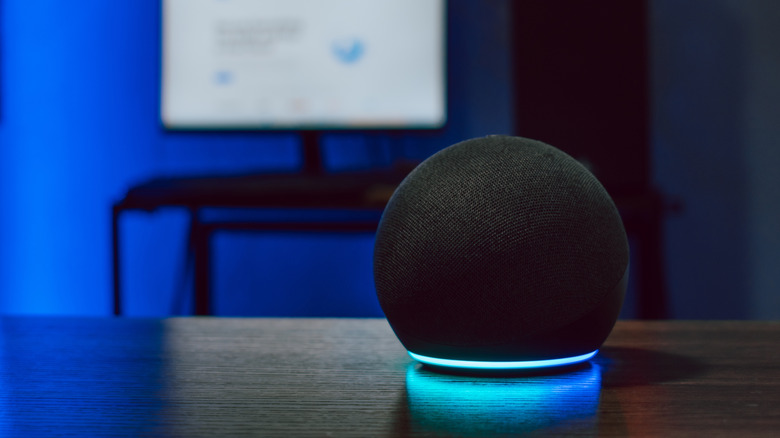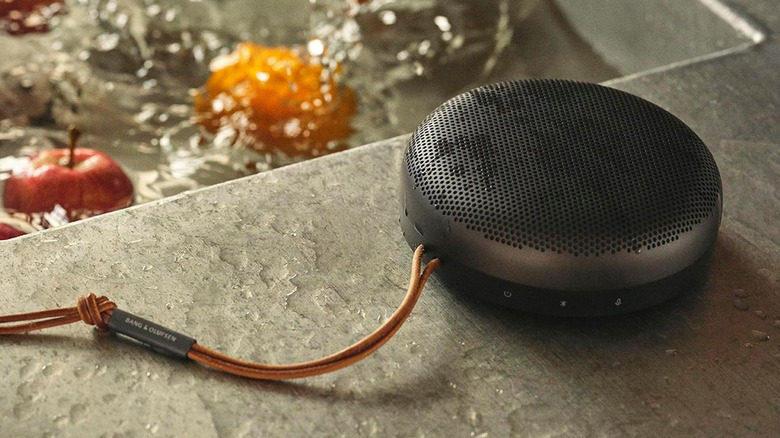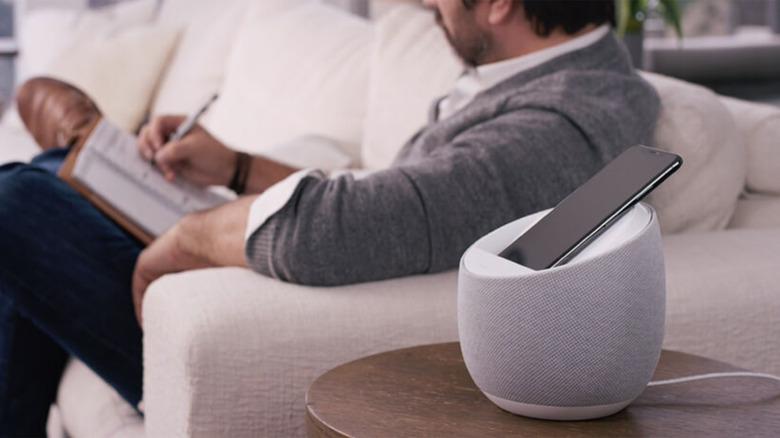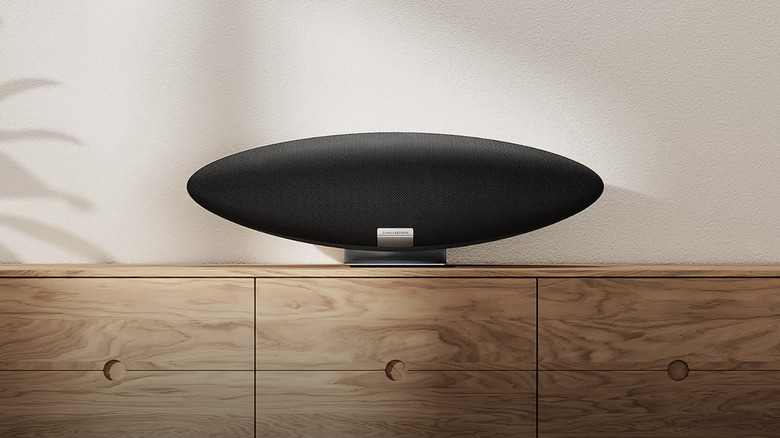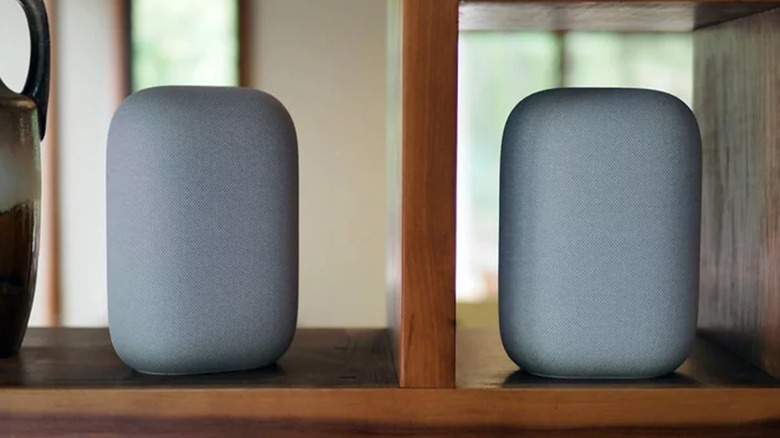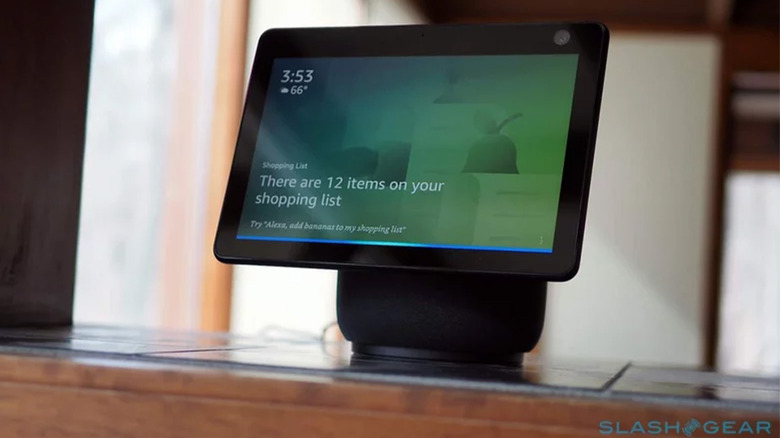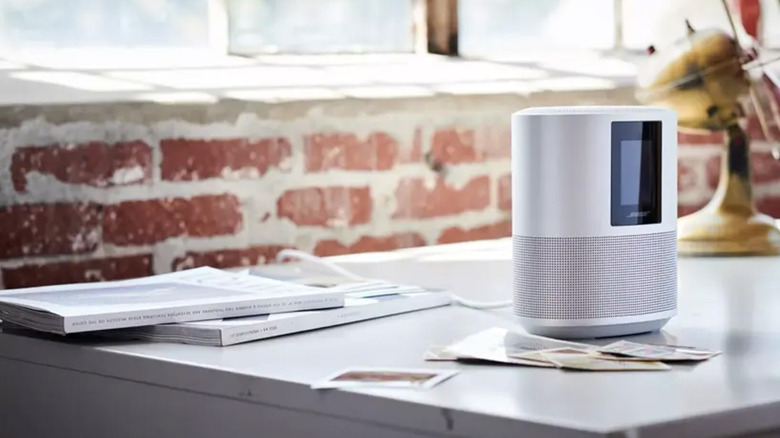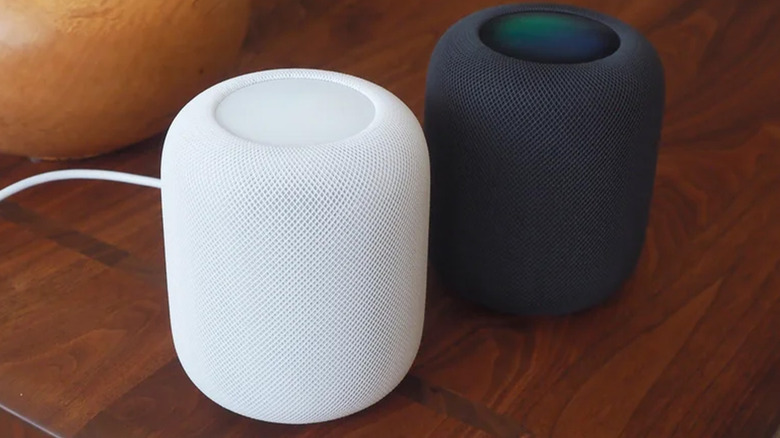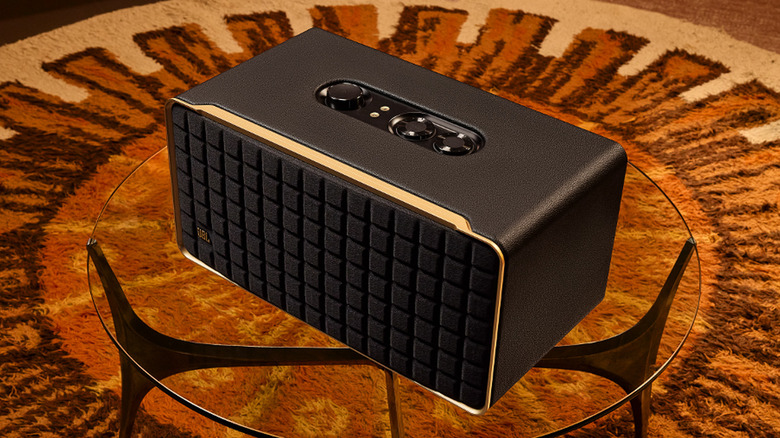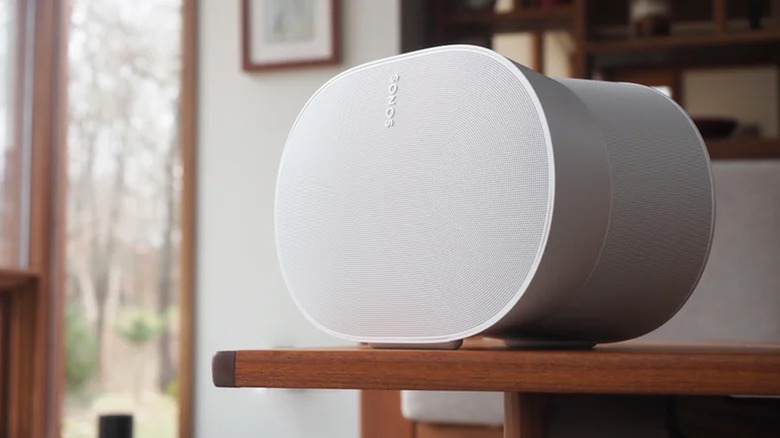Major Smart Speaker Brands Ranked Worst To Best (According To Consumer Reports)
We may receive a commission on purchases made from links.
Smart speakers often act as the centerpiece of a smart home setup since you can use voice commands to control almost any piece of smart home tech. They also have a variety of other uses, such as playing music, answering questions, and they even replace old-school alarm clocks. There are plenty of other uses for smart home speakers that you may not have even thought of yet. In short, these little devices work perfectly as a normal speaker and have the expanded capability to do other things too.
As such, companies have already begun the arms race to get their speakers into your home. Google, Amazon, and Apple are the big players since their speakers use each brand's proprietary smart assistants to answer your questions and perform tasks. In fact, choosing a smart speaker is often the first choice consumers run into when starting a smart home since all other smart home tech will need to be compatible with the speaker. Other brands have also released speakers that use the aforementioned tech brands' ecosystem so there are more choices than ever before.
Consumer Reports ranks smart speakers to help consumers figure out which speaker is best for them. We've taken that data and narrowed it down by brand to give you an idea of who makes the best smart speakers. Below is a list ranked worst to first that should give you an idea of which brands make the best smart speakers. We should note, however, that Consumer Reports doesn't have every available smart speaker that money can buy, so this list is based solely on what Consumer Reports has covered.
Bang & Olufsen
Bang & Olufsen is at the bottom of the list the lowest aggregate score from Consumer Reports. The brand is hampered somewhat by only having one entrant on Consumer Reports' list, the Beosound A1 2nd Gen speaker. The puck-shaped speaker offers some appealing features such as 18 hours of battery life of listening at 70 decibels and an IP67 water and dust resistance rating. In terms of portable speakers, it's actually pretty decent. It's also bigger than it looks as it'll barely fit in the average palm.
In B&O's defense, this smart speaker is made for portability more than it is anything else and it really should fit more in the portable Bluetooth speaker category than as a smart speaker. The Beosound A1 does come with Alexa built-in, so there is smart functionality there, but we have our doubts that people will buy this speaker, plug it in, and place it on a bookshelf for all eternity. Indeed, this speaker is built more for trips to the beach or as a shower speaker, and so while it has smart functionality, it doesn't fall into what many would consider smart speaker territory.
Overall, the B&O Beosound A1 is a good overall portable Bluetooth speaker that also comes with some smart functionality. In fact, for its size, it has seriously impressive sound quality, which helps because it's also quite expensive, with a MSRP of $299 on Amazon. However, if you're looking for that smart home centerpiece, you'll want to shop for another brand.
Belkin
Similar to B&O, Belkin only had a single smart speaker on Consumer Reports' list, so Belkin's score is a little hampered by that. Belkin's entrant to the list is the SoundForm Elite with an included wireless charger. It's closer to what you would expect a smart speaker to be with a round design that's meant to be plugged in and sat on a table or shelf.
Reviews indicate that the speaker sounds pretty good for its price point and people tend to enjoy the wireless charger on top of the speaker. It comes with Google Assistant, so you can talk to it like a Google Home Hub and run your smart home through it, making it automatically better than B&O's offering for smart speakers. For the most part, complaints about the device stem from functionality, as some folks have had trouble pairing with the speaker. The speaker also tends to lose its alleged hi-fi quality after about 50% volume, which bothers some folks more than others.
The biggest issue with Belkin is that the SoundForm Elite seems to be running out of stock in many places and it may be replaced with a new offering sooner rather than later. In any case, for a smart home speaker, there are better options out there than Belkin, even if the company makes plenty of other good products.
Bowers & Wilkins
Like the others so far, Bowers & Wilkins only has one smart speaker on the list, so its entire score is judged by that one speaker. The speaker is certainly a head turner with its wide, zeppelin-like shape. It's also among the most expensive speakers on the list at $799 on Amazon. It also comes in white if the black speaker isn't doing it for you.
The speaker comes with Amazon Alexa, so it's made for folks who already engage with the Alexa ecosystem. It's also much larger than it looks, spanning over two feet wide and a little over eight inches tall. So, it not only functions as a smart speaker but it's large enough to be the centerpiece of an entire room. In terms of sound, reviewers agree that it's among the best when it comes to smart speakers. There are five total drivers in the speaker, two for treble, two for midrange, and one six-inch subwoofer to deliver bass. The Zeppelin also has an app where you can mess with the EQ a little bit.
For the most part, the biggest issue with the speaker is that it's quite expensive. At $800, this thing is for a very specific audience and the $900 McLaren Edition is even more so. It pumps out loud, bass-rich music and it sounds fantastic. However, you can buy a half a dozen smart speakers with that kind of scratch and load your whole house with them.
Google is the first smart speaker maker on Consumer Reports' list that has multiple smart speakers to choose from — the Nest Hub Max and the Google Nest Audio. Both speakers are what you likely think of when you think of a smart speaker. The Nest Hub Max has a screen on the front that you can interact with, stream videos, and even conduct video calls. Meanwhile, the Nest Audio looks more like a traditional speaker but still operates as a smart speaker.
Each speaker has its pros and cons. The Nest Hub Max is the stronger option overall as a smart speaker thanks to its screen and superior sound quality. It's an upgrade over the regular Google Nest Hub in almost every way, with better audio and a bigger screen. For folks wanting to buy into Google's ecosystem, it's arguably the best speaker to go with as a first smart speaker. The Nest Audio is still quite good, although it lacks bass at louder volumes. It's a less expensive option that omits the screen but maintains the same Google Assistant functionality.
For people wanting to go with Google's ecosystem, Google's speakers are a solid choice. The Nest Hub Max is an excellent centerpiece device while the Nest Audio is good for multi-room smart speaker setups. I personally have a Google Nest Hub in my kitchen, and it's worked well for two years now. At this point, my kitchen wouldn't feel the same without it.
Amazon
Amazon is another big player in the smart speaker game. The brand has four total smart speakers on Consumer Reports' list, including the Amazon Echo Show 15, Amazon Echo (4th Gen), the Amazon Echo Show 10 (3rd Gen), and the Amazon Echo Studio. Amazon would actually be ranked higher on this list as the Amazon Echo Studio, Amazon Echo Show 10, and Amazone Echo rank quite well. However, Amazon's overall score is dragged down by the Echo Show 15, the lowest ranked individual speaker on the list.
For the most part, the Amazon Echo Show 15 is an okay product. Reviews state that the audio quality is mediocre and oddly, the speaker doesn't come with a table stand. Amazon instead includes wall mounting hardware as you are meant to put it on a wall. There are stands available on Amazon, though, so it is a problem that can be solved. It's otherwise quite nice, with a good screen with plenty of functionality. The other three speakers are a more positive experience overall. The Echo Show 10 is Amazon's response to the Google Nest Hub, which means it comes with a screen and a speaker. The other two are standalone speakers.
Of the three remaining speakers, our reviewers note that the Amazon Echo (4th Gen) and Echo Studio have excellent sound quality while the Echo Show 10 is the most versatile with its inclusion of the screen. Any of the three of those would make great starter smart speakers for Alexa-friendly households. The only hold out is the Echo Show 15 and that's mostly because it's ergonomically less friendly.
Bose
Bose had a solid overall showing on Consumer Reports. The well-known speaker brand sports two well reviewed smart speakers, making Bose a solid overall choice. What's more interesting is that both options from Bose on the Consumer Reports list are wireless, which is a bit of an oddity since most smart speakers are plugged into a wall. The first is the Bose Home Speaker 500 and the other is the Bose Portable Smart Speaker.
The Bose Home Speaker 500 is a wireless speaker with a small screen. It comes loaded with Amazon Alexa and Google Assistant out of the box, giving users some choice when it comes to which smart home platform they want to go with. It can also connect to Bluetooth or Wi-Fi to stream music, which is also unusual for a wireless speaker. Per reviews, the Home Speaker 500 sounds quite good for its size, although it can get a little rough at louder volumes. Most of the same can be said for the Bose Portable Smart Speaker, which also houses Google and Alexa and sounds decent at moderate volumes. However, its battery life isn't great and it doesn't get very loud.
In all, Bose has the same issue as Bang & Olufsen, where you don't typically shop for wireless smart speakers. However, Bose does have a leg up on its competitors by having multiple smart home assistants available. Even so, for wireless audio, we still think a regular Bluetooth speaker does it better.
Apple
Apple only has one speaker on the Consumer Reports list and it's the Apple HomePod. As Apple's solo entrant onto the list, Apple earns a higher score than most. The HomePod comes in two colors and is typical of what you'd find in a smart speaker. It plugs in, integrates with Siri, and you can use it to control your smart home. Interestingly, the HomePod mini isn't on Consumer Reports' list, which is a shame.
In any case, the HomePod makes a good case for Apple. It has good overall sound quality, which is good because Apple doesn't give users an EQ to tweak it themselves. Its understated design looks good in most rooms and, of course, it's one of the few smart speakers on the market that can interact with Apple's smart home ecosystem. There are some neat tricks too. For example, if you have two speakers in a stereo configuration, Apple uses beamforming technology to broaden the soundstage and make the speakers sound bigger than they are. The speakers can also be used with an Apple TV device as TV speakers, giving them a little extra versatility.
The biggest downside for the HomePod is its price. It costs $299 direct from Apple, which is more than Amazon and Google speakers. The HomePod mini costs $99, which makes it the better value buy if you want speakers in multiple rooms, but the HomePod is excellent overall, so it's one we imagine most Apple smart home users will want.
JBL
Consumer Reports seems to like JBL quite a bit. Their list has three JBL speakers on it — the JBL Authentics 500, Authentics 300, and Authentics 200. As smart speakers go, JBL does some unique things in this space, including allow the speakers to connect to Alexa and Google Assistant simultaneously, omitting the need to choose for the end user. Reviews say that the smart assistants don't always work well together but it's still something you don't see everyday.
In general, all three speakers can be used wired, which makes them a good option for sitting on a bookshelf. The Authentics 300 also has a built-in batteries and can be used as portable speakers, it the only speaker on the list that is designed for both portable and at-home use. The downside is that the battery life on both speakers is mediocre, so you may not want to take them far. In terms of sound quality, reviews for all three speakers show that they all sound excellent and include JBL's Self-Tuning feature, which matches the sound signature with your room's acoustics.
It seems too good to be true until you look at the price tags. The Authentics 200 runs for $349.99 when it's not on sale and that's the least expensive one. You'll spend $449.99 for the JBL Authentics 300 and $699.99 for the Authentics 500. These are high-end speakers, though, and there's a reason Consumer Reports rates them so well.
Sonos
Sonos tops the Consumer Reports list and therefore it tops our list as well. It has three speakers on the list, including the Era 300, Move 2, and the Era 100. Generally speaking, Sonos makes good products and our reviews agree with that notion, so Sonos topping the list isn't the most surprisingly notion. Of the three options, the Era 300 and 100 are wired speakers and the Move 2 is wireless, making Sonos and JBL the only brands on the list that have both options.
The Era 300 and 100 are good for the same reasons. Both of them sound good for their respective sizes. They include Amazon Alexa and Sonos' own assistant platform should you choose to use it. Sonos used to support Google Assistant but doesn't seem to on their latest generation of speakers. Additionally, both speakers can be used in stereo configurations for home theater setups or for some excellent music sound in your living room. Meanwhile, the Move II is a wireless speaker that also only has Alexa and Sonos' own assistant. On the plus side, the Move 2 also sounds excellent for its size and has some of the best battery life of any wireless smart speaker on the list.
Like JBL, Sonos is an expensive brand. The Era 100 costs $249 when it's not on sale and the Era 300 nearly doubles that price at $449. The Move 2 is also more expensive than most Bluetooth speakers at $449. So, while Sonos speakers are quite good, it'll cost you approximately one arm and leg to get a multi-speaker setup at home.
